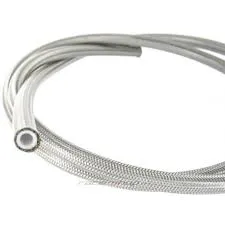Nov . 01, 2024 06:29 Back to list
CE Certification for Hydraulic Rubber Hose Products Compliance and Quality Assurance
CE Certification for Hydraulic Rubber Hose Products An Overview
In the manufacturing and engineering sectors, safety and quality are paramount. Hydraulic rubber hoses are essential components used in various applications, including construction, automotive, and industrial machinery. To ensure that these products meet stringent safety and performance standards, CE certification plays a crucial role. This article will delve into the significance of CE certification for hydraulic rubber hose products and the processes involved in achieving it.
The CE mark, which stands for Conformité Européenne, is a certification indicating that a product meets the essential requirements of relevant European Union (EU) directives. For hydraulic rubber hoses, this certification signifies compliance with various health, safety, and environmental protection standards. This not only helps in ensuring the reliability and safety of the hoses but also facilitates their acceptance in international markets, particularly within the EU.
To obtain CE certification for hydraulic rubber hoses, manufacturers must undergo a rigorous testing and evaluation process. This involves several key steps, including design assessment, prototype testing, and the implementation of quality control measures. During the design phase, manufacturers must consider factors such as pressure ratings, temperature resistance, flexibility, and compatibility with hydraulic fluids. The hoses must be engineered to withstand the conditions they will be subjected to during operation, ensuring they do not fail under pressure or environmental stress.
ce certification hydraulic rubber hose products

Once the design is finalized, prototypes of the hydraulic hoses are subjected to a series of tests. These tests assess their performance and safety features, including burst strength, abrasion resistance, and aging properties. Depending on the specific application and regulations, additional tests may be required to evaluate factors such as resistance to chemical exposure and fire safety. This comprehensive testing phase is crucial for identifying any potential weaknesses or design flaws before mass production begins.
In addition to testing, manufacturers must also implement a robust quality management system. This includes regular inspections and audits of the manufacturing processes, ensuring that every batch of hoses produced adheres to the established standards. Quality control measures may involve both in-process checks during manufacturing and final inspections before the hoses are packaged and shipped. By maintaining high-quality standards throughout production, manufacturers can ensure that their products consistently meet CE certification requirements.
Achieving CE certification not only enhances the credibility of hydraulic rubber hose products but also builds trust with customers and stakeholders. It demonstrates a commitment to quality and safety, which is increasingly important in today's competitive marketplace. Furthermore, with CE certification, manufacturers can access broader markets, reduce barriers to trade, and potentially increase their sales and revenue.
In conclusion, CE certification is a vital aspect of the hydraulic rubber hose manufacturing process. It ensures that products are safe, reliable, and of high quality, protecting both end-users and manufacturers alike. As industries continue to evolve and regulatory standards become more stringent, the importance of obtaining CE certification for hydraulic rubber hose products will only grow. Manufacturers must invest in quality assurance processes and adhere to rigorous testing standards to secure this certification, ultimately leading to safer and more efficient hydraulic systems in a wide range of applications.
-
1 1 2 Inch Hydraulic Flexible Hose - Durable, Reliable, High-Pressure Solutions
NewsJul.07,2025
-
High-Quality 1 2 Rubber Hose - Durable, Flexible Hydraulic Solutions
NewsJul.07,2025
-
Discover SAE Hydraulic Hose Types - High Quality & Durable Hoses from Leading Factory Supplier
NewsJul.06,2025
-
High Pressure Wire Hydraulic Rubber Hose Supplier Durable & Reliable 1SN Hose Solutions
NewsJul.06,2025
-
High-Quality Rubber Air Hose 3/8" – Durable, Flexible & Leak-Proof for Industrial Use
NewsJul.05,2025
-
High Quality Rubber Air Hose 3/8 - Durable 3/8 Rubber Air Hose with Air Brake Hose Fittings
NewsJul.05,2025
